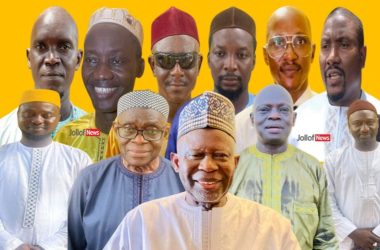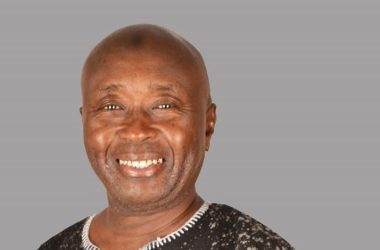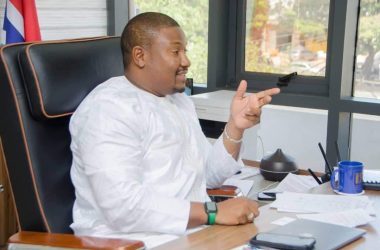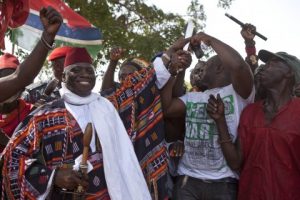
(JollofNews) – The power of prayer
Surprisingly, even the victims’ immediate families told me, “Be careful! Just pray!” They expressed the spirit of The Gambia (prayer), a country where people would lift their hands and pray at every opportunity.
I stopped, again. Acquiescent, but steeped in guilt, I decided to now focus on what I believe so many Gambians, better than I, were doing across the nearly 11,000 square kilometers of Gambian territory, a tiny but blessed nation.
“If I have to only pray then I better go to Mecca (because I am not good enough on my own, but I am fortunate to live only a couple of hours away by plane from the Holy City) and do it there,” I decided. To Mecca I headed, for umrah and prayer for The Gambia. The Prophet Mohamed (peace be upon him) did say that prayer is the weapon of the believer and this is supported by the Holy Bible.
The elections came on December 1st and miracles happened! On the day before the results were announced, a friend of mine, arguably the most prominent Gambian businessman, asked me: “What do you think?”
“Insha Allah,” I stressed, “Jammeh would lose, but I cannot predict his reaction or that of the Gambian people.” It was just a feeling and nothing more! Or if anything more, it would be the power of Insha Allah from the heart.
President Jammeh did lose to a man very few people knew and the President graciously conceded. I have never been so much interested in Gambian politics. I was glued to the television set (which I rarely watch), as the results of the elections were announced.
I have never felt prouder as a Gambian, as I watched kids singing and dancing in joy! I was proud of my compatriots at home and the united coalition of political parties. I was impressed by Jammeh’s excellent speech as a Muslim and a democrat, demonstrating to the world that there is no conflict between the two and falsifying criticisms that he is neither.
The concession helped him to wrestle his enemies to the ground with incredible feat and pave his way to the positive annals of The Gambia and Gambians. I was happy for everyone. ! ﺍﻟﺤﻤﺪ ﷲ. I arrived in Abidjan, the next day, for a business trip. I flashed my passport in front of the immigration officer who processed my papers at the airport. He smiled, saying “Felicitations!” Success is sweet, even if your role is only to pray!
Too good to be true?
Is it all or partly too good to be true? Jammeh shocked Gambians, or most, on December 9th. Upon second thought, he could not believe that he has lost. His change of mind was an expression of the disbelief and fear of what lay ahead of him.
He must have watched and/ or listened to reports of his pictures being torn and soldiers celebrating with civilians in the streets. Most terrifying for him must have been the pictures and videos of atrocities, such as the charred body of Ceesay, and the calls for him to be handed over to his former Justice Minister at the International Criminal Court (ICC).
Ordinary Gambians had reason to celebrate euphorically, but I think that statements of a few of the coalition leaders should have been better calculated, after Jammeh’s unexpected concession. The Gambia is now flung into confusion and the risk of civil conflict, with a dangerous ethnic dimension. Jammeh has allowed his enemies to rise over him again and historians are rewriting the annals. I better turn my passport upside down on my way out at Abidjan Airport!!
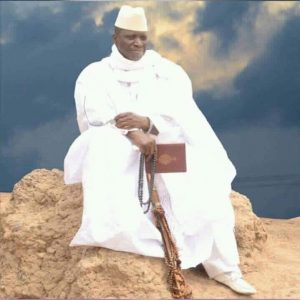
Hadamaya and “tribalism”
What can we do? As someone who has had several political opportunities since high school, but turned down all of them, and as a Catholic-educated Gambian, Muslim, Mandingo with a Fula base, from three regions (grandfather from Niumi, parents from Kiang, born in Foni), I feel a sense of objectivity about nation, “tribe”, religion and politics, which many compatriots may not have. It is for this reason, that I have finally decided to dip my finger into Gambian politics as our nation stands at historical and political crossroads.
Before any attempt to answer the question of what is doable, it would be honest to admit that Jammeh’s 22-year rule has destabilized the traditional Gambian hadamaya, across the board. Jammeh did so through an amorphous type of relatively quiet violence the like of which had never been seen in The Gambia before. I doubt if there is any Gambian family (even his strongest supporters) who has not heard the sound of his whip at least once.
I doubt if there are many. Even as a distant observer, it appeared to me that the biggest victims were those closest to him, including Jolas, army and intelligence officers and his Ministers. This is why even the good things he has done are ignored by his critics and may be subjected to reversal after his rule. This is also why I think it would not be easy to find very many Gambians who would sincerely defend him out of love instead of fear.
Hadamaya was also struck at the core through the exaggeration of “tribalism”, which was never a serious issue in The Gambia before Jammeh. However, his “tribal” tirades against Mandingos were both of his making (in order to mask his oppression of other ethnic groups (including his fellow Jolas)) as well as those of some of my fellow Mandingos who have fallen into his trap or into whose trap he has fallen.
I have in recent years heard some non-Jolas describe him scornfully as “a Jola President!” Ironically, I have also heard a Jola describe him the same way! The best statement I have heard from a Gambian with regard to Yahya’s “tribal” ploys was from a Jola civil servant who was once stranded in my house in Accra: “If he puts us in the limelight whilst he rules, he would put us in danger the day he leaves”.
Jammeh may not be a “tribalist” by conviction, but someone who uses “tribalism” for political expediency.
He proudly exposed his Mandinka side to me in Addis, including (if I remember rightly), the time he spent in Kiang, his ability to speak the language, and telling “Mbemba (a Sarahule) that Sarahules are Mandingos!” He quoted the Holy Qur’an to me in Mandinka and the only languages I could remember being spoken around him were English and Mandinka.
So why did he publicly threaten to exterminate Mandingos? Why did he publicly choose “hell instead of a Mandingo Government in The Gambia”? So how did things go so wrong that the UN had to warn him in June 2016 about the genocidal implications of his anti-Mandingo threats? The answer is not as complicated as you may think. As Bob Dylan’s famous 1962 song goes, “the answer, my friend, is blowin’ in the wind” – power and bad advice!
To be continued.

